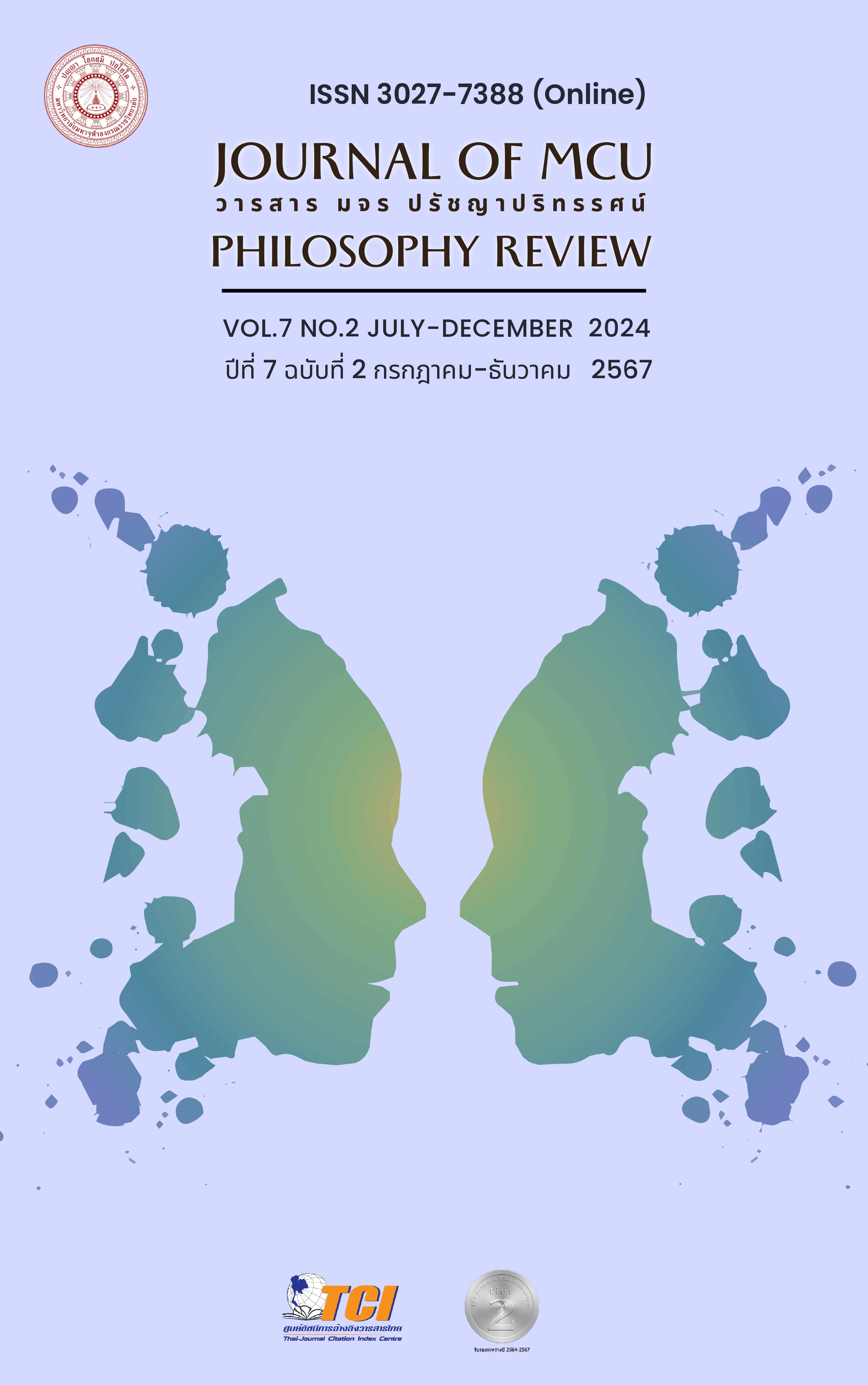Development of a Buddhist psychology counseling process for cancer patients receiving chemotherapy
Main Article Content
Abstract
The objectives of this study were: 1) Study the Buddhist Psychology Counselling Process (BPCP) related to psychological suffering of cancer patients receiving chemotherapy; 2) Evaluate the Buddhist Psychology Counselling Process (BPCP) of cancer patients receiving chemotherapy. This study used qualitative research applying a documentary research method. Use a summary content analysis method. 1) The results of this study showed that there are five steps of the Buddhist Psychology Counselling Process (BPCP) for cancer patients receiving chemotherapy: 1) Building a relationship consists of making an impression, establishing rapport, creating friendship, being honest and offering support; 2) Exploring causes of suffering: separation, loss of image and the unknown. 3) Understanding suffering includes: fear of loss and detachment, treatment processes, loss of image and fear of dying. 4) Raising awareness of merit and goodwill: thinking of your good fortune and deeds, self-esteem, self-inspiration, self-connection and consciousness. 5) Mindfulness practices include: Breathing exercises, staying present, smiling meditation, Metta Bhavana meditation and Gratitude meditation exercises. 2) The findings from evaluation of Buddhist Psychological Counseling Process for Cancer Patients Undergoing Chemotherapy. All seven experts agreed unanimously deemed it highly appropriate overall. When implemented, the results showed that after the patient received Buddhist psychological counseling services. The final results indicated that the BPCP had a positive influence on both psychological and physiological outcomes and health behaviours. Behavioral changes include: 1) improves acceptance of health conditions and illnesses, 2) releases self-attachment, 3) increases positive thinking, and behavioral changes, including 1) Openness and willingness to ask for help from health care providers, 2) Promoting self-care and self-management, 3) positive expressions with themselves and their image, 4) returning to interaction, 5) being mentally stable and accept the truth of life.
Article Details

This work is licensed under a Creative Commons Attribution-NonCommercial-NoDerivatives 4.0 International License.
บทความที่ได้รับการตีพิมพ์เป็นลิขสิทธิ์ของวารสาร มจร ปรัชญาปริทรรศน์
ข้อความในบทความที่ได้รับการตีพิมพ์ในวารสาร ถือเป็นความรับผิดชอบของผู้เขียนบทความ และข้อคิดเห็นนั้นไม่ถือว่าเป็นทัศนะและความรับผิดชอบของกองบรรณาธิการวารสาร มจร ปรัชญาปริทรรศน์
References
กัญกร คำพรรณ และคณะ. (2565). การฟังอย่างลึกซึ้งเพื่อเยียวยาความทุกข์ตามหลักพุทธจิตวิทยา.วารสาร มจร มนุษยศาสตร์ปริทรรศน์, 8(1), 54-66.
บุญมี แก้วตา และคณะ. (2562). ศึกษาความสัมพันธ์ระหว่างหลักไตรลักษณ์กับความผาสุกทางจิตวิญญาณ, วารสารพุทธศาสตร์ศึกษา, 10(2), 87-98
ประทีป พืชทองหลวงและคณะ. (2561). กระบวนการและทักษะการปรึกษาเชิงพุทธจิตวิทยา.วารสารปณิธาน: วารสารวิชาการด้านปรัชญาและศาสนา, 14(1), 205-215.
พิณจ์ทอง แมนสุมิตร์ชัย. (2560). “รูปแบบการสื่อสารอย่างสันติเชิงพุทธจิตวิทยา”. วิทยานิพนธ์พุทธศาสตรดุษฎีบัณฑิต, บัณฑิตวิทยาลัย: มหาวิทยาลัยมหาจุฬาลงกรณราชวิทยาลัย.
รินดา ประกอบบุญ. (2565). สมาธิภาวนาเพื่อการพัฒนาจิตให้เป็นสุขท่ามกลางสถานการณ์โควิด-19. วารสารสหวิทยาการวิจัยและวิชาการ, 2(2), 95-106.
วิชชุดา ฐิติโชติรัตนา. (2561). การพัฒนารูปแบบการปรึกษาแนวพุทธจิตวิทยาบูรณาการของพระสงฆ์ที่มีบทบาทให้การปรึกษา พุทธศาสตรดุษฎีบัณฑิต สาขาวิชาพุทธจิตวิทยา. บัณฑิตวิทยาลัย: มหาวิทยาลัยมหาจุฬาลงกรณราชวิทยาลัย.
ศมนนันท์ ทัศนีย์สุวรรณ และกิตติกร นิลมานัต. (2562). ภาวะบีบคั้นด้านจิตใจของผู้ป่วยโรคมะเร็งระหว่างรับการรักษา ด้วยเคมีบำบัดและการพยาบาล.วารสารพยาบาลสงขลานครินทร์, 39(4), 54-67.
สุภัสร์ สุบงกช. (2560). เภสัชกรรมปฏิบัติในโรคมะเร็ง.Oncology Pharmacy Practice.ขอนแก่น-โรงพิมพิมพ์มหาวิทยาลัยขอนแก่น.
โสรีช์ โพธิแก้ว.(2542). การประยุกต์อริยสัจ 4 ของพระพุทธศาสนา กับการปรึกษาเชิงจิตวิทยาและจิตรักษา, รายงานการวิจัย, กรุงเทพมหานคร: คณะจิตวิทยา จุฬาลงกรณ์มหาวิทยาลัย,
โสรีช์ โพธิแก้ว. (2553). การสังเคราะห์หลักอริยสัจ 4 สู่กระบวนการปรึกษาเชิงจิตวิทยา/จิตรักษา เพื่อการพัฒนารักษา และเยียวยาชีวิตจิตใจ:แนวคิด แนวทาง ประสบการณ์ และงานวิจัย. กรุงเทพมหานคร: จุฬาลงกรณราชวิทยาลัย.
American Cancer Society. (2566). Cancer Fact Figures. Atlanta: American Cancer Society.
Callroll-Johnson, (2549). R.M.Psychosocial nursing care along the cancer continuum, :https://pureadmin.qub.ac.uk/ws/portalfiles/portal/128955595/TCT_Blueprint_31_10_2016.pdf.
National Cancer Institute website. (2566). Types of cancer treatment. www.cancer.gov/about-cancer/treatment/types. Accessed March 10.
NCCN Guideline for patients, Distress During Cancer Care. (2024). [Online 10 1 2024] : NCCN.org/patientguigelines.)
Tamura, S., Suzuki, K., Ito, Y., & Fukawa, A. (2564). Factors related to the resilience and mental health of adult cancer patients: a systematic review. Supportive Care in Cancer, 29(3), 3471-3486.


